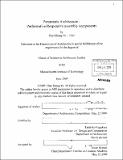Parametric architecture : performative/responsive assembly components
Author(s)
Yu, Huei Sheng
DownloadFull printable version (33.60Mb)
Other Contributors
Massachusetts Institute of Technology. Dept. of Architecture.
Advisor
Takehiko Nagakura.
Terms of use
Metadata
Show full item recordAbstract
Current parametric design generates many possible solutions during modeling and design process, but in the final stage, only allows users to choose one solution to develop. This thesis demonstrates a design strategy for physical parametric design that embeds knowledge from simulation tools and helps parametric design still keep variations after final model. This thesis begins with an introduction of theory and practices of current parametric design and clarifies the connections between its methods and physical parametric design. Then a few new concepts and prototypes are proposed, and physical parametric designs are demonstrated. The thesis presents a series of case studies investigating specific parametric design methods. Their objectives are studying ways to implement variations from parametric design to physical world and to fix parametric design's constraint problem through the use of physical feedback loop. Some cases are related to simulation environment which can be used as a test platform for fabrication or responsive environment design: others are different data access, such as visualization. Together, these physical parametric design projects indicate how to solve the bidirectional constraint in design exploration. Finally, this paper evaluates new possibilities of this design strategy and construction method, and discusses how the physical models impact digital parametric models. key words: parametric design, Artificial Intelligence Knowledge Base ,Evolution system design, simulation environment.
Description
Thesis (S.M.)--Massachusetts Institute of Technology, Dept. of Architecture, 2009. Page 127 blank. Includes bibliographical references (p. 121-122).
Date issued
2009Department
Massachusetts Institute of Technology. Department of ArchitecturePublisher
Massachusetts Institute of Technology
Keywords
Architecture.